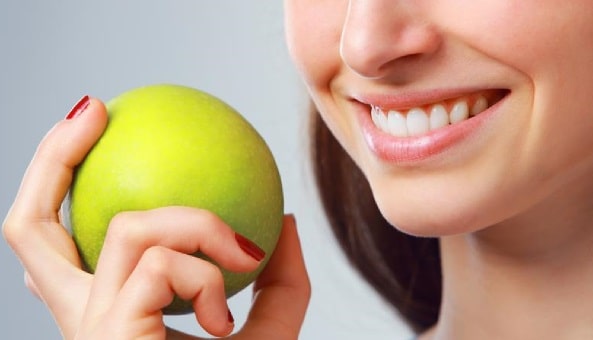The Impact of Raw Vegan Diet on Dental Health & Oral Hygiene

Many people become vegetarians motivated by a desire to live a healthier lifestyle. Becoming a vegetarian or vegan is a completely personal choice. Having a plant-based diet can have many health benefits, one of which is oral health. In this article, we want to talk about the effect of vegetarianism on dental health and see whether having a vegetarian diet can really help dental health or not.
Veganuary is the latest diet that became popular in 2022.
Having a vegan diet can bring several health benefits. This vegetarian diet includes all kinds of fruits and vegetables and can reduce the risk of previous diseases and cancer.
A plant-based diet is typically rich in hydration, vitamins, minerals, fiber, and phytonutrients.
Eating a plant-based diet can be full of positives for maintaining oral health. Also, the health of your mouth and teeth can affect the overall health of your body. For example, with the development of periodontal disease, it is possible to increase the risk of Alzheimer's disease and heart diseases.
Nutrition is the key to oral and dental health. Its effect is related to our safety and condition and can directly affect the periodontal condition. The vegetarian diet is rich in antioxidants and of course plant chemicals that are very efficient and useful for oral and dental health.
When it comes to oral health, this case will show that vegans can do much better in maintaining their oral health. People who follow a vegan diet smoke less or consume less sugary drinks. These things help their oral health a lot.
The question that is raised now is that the vegan diet is associated with risks? In response to this question, we must say that if they are not properly informed or trained about this method, vegetarians can very likely suffer from many dental health problems, which include:
Tooth Decay
Increased acidic pH level in the mouth
Lack of saliva production
Compared to the normal diet that people have, vegetarians may face more problems due to the elimination of some foods from their diet. It's true, eliminating certain foods from your diet can turn into key vitamins and nutrients like vitamin D and calcium that can be vital for overall dental health.
Let's walk you through some of the key risks to be aware of when following a vegan diet:
Calcium
Calcium can be a main need for the human body, which not only supports the health of bones, but also can guarantee the health of teeth and gums. Fish and dairy products are the best sources of calcium. However, this option will not include vegans. In order to rid the body of calcium, vegetarians should supplement their diet with a sufficient amount of plant sources that contain calcium. Some plant sources that contain calcium are: soybeans, kale, tofu, almonds, broccoli, etc.
Vitamin D
Another key risk that vegetarianism will have on the health of the teeth and the whole body is the consumption of vitamin D. Vitamin D is needed for the absorption of calcium. Among the best sources of vitamin D are fatty fish, eggs, fortified milk, etc. Besides these foods, the best source of vitamin D can be the sun. In order to get enough vitamin D, vegetarians can spend some time outdoors in the sun in the morning. Of course, we should also add that vegans can also get vitamin D from other foods such as mushrooms.
Amino acids: the effect of vegetarianism on dental health
Amino acids such as arginine can play an important role in caries and gum diseases by cleaning the excess dental plaque. Amino acids, especially arginine, can be found in: poultry, meat, fish and dairy products.
In order to get a sufficient amount of amino acids, vegans should supplement their diet with plant products such as lentils, peas, soybeans, and pumpkin seeds.
The risk of tooth erosion due to sugar consumption
Vegetarians will be at a higher risk for tooth erosion due to high consumption of acidic foods and other foods that contain a lot of sugar, such as fruits.
To be vegetarian or not?
There is no problem in wanting to become a vegetarian if you can supplement your diet with whole foods. In the following, we will introduce you to some key ways to maintain the health and hygiene of the teeth. Follow us on the impact of vegetarianism on dental health.
Important points in maintaining oral health in a vegetarian diet
Follow a whole plant-based diet.
Increase your water intake to maintain saliva flow and a healthy pH level in your mouth.
Limit the consumption of sweet and acidic foods.
In order to prevent the development of caries and plaques, avoid consuming fast snacks.
Be sure to rinse your mouth properly with water after every meal.
Don't forget to brush after eating (wait at least 30 minutes after eating to avoid tooth enamel erosion)
At least it is better to brush and floss your teeth twice a day.
برای نمایش آواتار خود در این وبلاگ در سایت Gravatar.com ثبت نام کنید. (راهنما)






















































ایمیل شما بعد از ثبت نمایش داده نخواهد شد